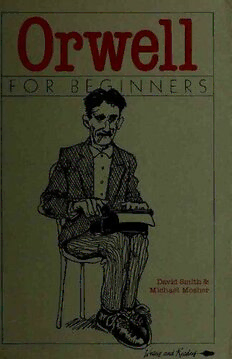
Orwell for Beginners PDF
Preview Orwell for Beginners
Orwell O N N F R E R S & David Smith Michael Mosher l/iitit^ aiUi\ediUff-- ^; Oi^Mf^^^-^ ABOUT BOOKS THE Writers and Readers Documentar/ Comic Books are Introductions to some of the major thinl<ers and ideas of our time. Their form pioneers an attempt to brins words and imases tosether and to translate the most complicated information into a simple, readable and amusins stor/. They challense accepted educational notions, presentins simplifications that are intellisent and not patronizins. Orisinally intended for the uninitiated, experts from all over the world have come to admire and use the series. We besan the series with books on Marx, Einstein and Freud. These provided the steppins stones for future books in histor/, current events, philosophy, psycholosy and the biolosical and physical sciences. New lines of development are continuins. While the Besinners Series was orisinally published in Ensland, it istodayavailable in sixteen lansuasesand in manyoftheworld's majorcities, from Tokyoto New York. In the back of this book you will find a complete listins of books in the series and forthcomins titles. To N^^ FAivvn^vx' /V<Ot^ ALU ^AV TeACHeRS , fRsi(£NP^ M' FR^p © Textcopyright 1984DavidSmith © Illustration copyright 1984Michael Mosher Set in 14/16pt. TimesRomanbyArchetype. Special typefaces setbyTurnaround. Paste-upby RedToadProductions. Editorial production byDavidSmith. All rightsreserved underinternational andPan-AmericanCopyrightConvention. Publishedby WritersandReadersPublishingCooperativeLtd. London. , Simultaneously published in the United StatesofAmericaandCanada by WritersandReadersPublishing Inc. ISBN 86316 066 2 A Writersand ReadersDocumentaryComic Book© 1984 Manufactured inthe United StatesofAmerica. First Edition 1234567890 About theAuthor: DavidSmith istheauthorofMarx'sKapitalforBeginners, RonaldReaganfor Beginners, and WhoRulesThe Universities?AnEssayinClassAnalysis. AbouttheIllustrator: Bestknown in SanFranciscoasacommunity muralistandpainter, Mike Mosher's beendrawingcartoons like thisforyears. C::fC€f-<^<z.O<ru>€jl i'lO^'l^c^o CONTENTS Politics 4 JoiningthePOUMMilitia 118 TheParadox 22 The PersecutionofRadicals 127 LearningtoConform 30 Coming UpForAir 135 PolicingtheEmpire 48 WarandRevolution 148 BurmeseDays 58 AnimalFarm 155 Writing, Eileen, Socialism 70 Power-Worship 160 Books andThemes 79 FaithandFatalism 168 Joiningthe People 95 Utopia? 171 Wigan Pier 106 NineteenEighty-Four 173 TheSpanishWar 108 References 191 Few w—riters have been as influential—or as inadequately under stood as George Orwell. Orwell's influence is unmistakable. Several key terms from his works— 1984, doublethink. Big Brother—belong to the public domam, and his very name is ajournalistic commonplace. The phrase "Orwellian"— applied to an idea or a regime—has the same emotional impactforthisgeneration thattheterm ''Machia- vellian" had for previous generations. Picture a vast, icy, impersonal police-state with a hateful ideol- — ogy: this is the so-called Orwellian vision a vision, it now seems, ofmythic dimensions and lasting currency. — Above all, George Orwell's influence is political. Th—e two great novels upon which his reputation rests AnimalFarm and 1984 are both entirely political. Slender, deftly-etchedAnimal Farm is a barbed parable ofthe 1917 Russian Revolution and its aftermath, with a cautionary moral: that the new regime, Stalin's, is just as tyrannical as its Tsarist precursor; that the Bolshevik revolution, like the French revolution of 1789, fell victim to a Napoleonic dictator. 1984 is even more sweeping: a ferocious satire on all forms of "totalitarian" powerandculture, with aclearreference, again, tothe Stalinistoligarchy in the Soviet Union. But Stalinism is hardly the only target ofOrwell's withering critique in 1984. Fascism and capitalism are also indicted. This is a point on which Orwell is widely misunderstood. The popular impression is that, more than anything else, George Orwell sounded a warning against Communism; that Soviet Russia is the unique object ofOrwell's scorn for tyrants; in brief, that Orwell perfected an equation linking socialism and dictatorship. The reality is quite different. George Orwell did unmask Soviet Russia— not as socialist, however, but as a dictatorial parody of socialism. Personally, Orwell waspassionatelypro-socialist. In 1937he fought in the Spanish civil war in a revolutionary contingent organized by the non-Stalinist POUM(the Workers' Party forMarxist Unifi- cation). From January until June 1937—until shot in thethroat Orwell joined anarchist and socialist workers resisting , Fascist armies sponsoredbyHitlerandMussolini. Fascism did, ultimately, win, but the indelible impression Orwell received was not ofdefeat, but offuture revolutionary possibilities . . . — George Orwell felt that he had seen the future and that it worked. A panorama ofworker creativity, solidarity, and de- cency had unfolded before Orwell's eyes, giving him hope, for the first time, that radically democratic socialism is possible. The circumstances which had permitted Fascism to defeat the revolutionary Spanish syndicalists would not recur inevitably in the future. Next time, or the time after, the workers might win. fomaj^e to Catalonia, Coming UpforAir,Ani- mal Farm, and 1984 are the principal books written between 1937 and Orwell's early death in 1950. Together with a stream of wonderful essays, these books are Orwell's testament. 8
